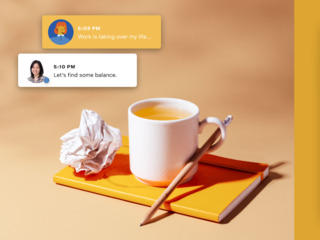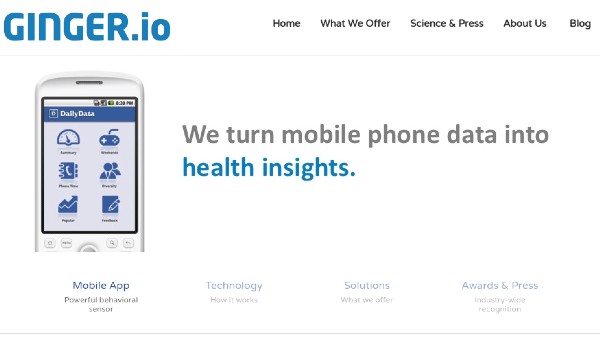 Our when they were young series is a look back at the modest days of startups, what traction they had in their first few years, and how they evolved. In the end, we hope to provide a glimpse into what great startups looked like in their first three years.
Our when they were young series is a look back at the modest days of startups, what traction they had in their first few years, and how they evolved. In the end, we hope to provide a glimpse into what great startups looked like in their first three years.
Stories like these are always well received because it reminds us that anyone, regardless of pedigree and environment, can rise above the noise and have great influence. They show us the value of being resilient, persistent, and committed. If we can follow their footsteps, maybe we too can have similar success.
This segment is on Ginger.
— Ginger’s First Year —
Founders: Alex Pentland, Anmol Madan, Karan Singh, Ryan O’Toole
Founded: Ginger.io is incorporated as Gingerd in Massachusetts on August 27, 2010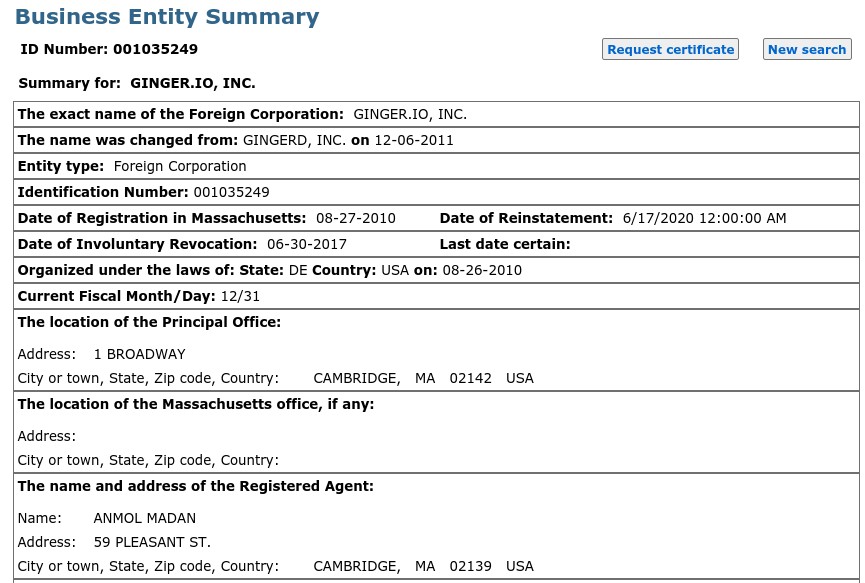 Initial company description: Ginger, founded at the MIT Media Lab, is initially focused on how data is collected and applied in research and clinical care. It acts as a behavior analytics platform, monitoring health data which it then sells to healthcare providers. Its initial app is called DailyData.
Initial company description: Ginger, founded at the MIT Media Lab, is initially focused on how data is collected and applied in research and clinical care. It acts as a behavior analytics platform, monitoring health data which it then sells to healthcare providers. Its initial app is called DailyData. 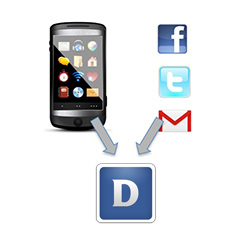
“We are dedicated to helping you manage your health and the health of your loved ones. We believe mobile devices can and will have a significant positive impact on our wellness. We believe quality data has been a missing ingredient,” the company says on the “about” section of its website in 2011.
“Our company is based on cutting-edge models and predictions developed by MIT engineers and scientists. Read more about the underlying models published in academic journals in our Technology section or check out articles from the popular press below.”
“We take large amounts of data, particularly from your mobile phone, and make it, for instance, about your health. So, think of it like a check engine light that a doctor might use to understand how their patients are doing”, Singh says in 2012.
The name Ginger comes from when Singh was young, and his mother would brew him ginger tea when she could sense that he was about to get sick.
“A preventative health remedy that originates from Southeast Asia, the ginger root is commonly used at the first sign of illness, before things get worse. Similar to this approach, the Ginger system takes a preventative approach to mental health, addressing issues before they evolve into greater challenges and providing support anywhere, at any time. By bringing the power of on-demand mental health support to hundreds of thousands of people globally, we continue to advance our mission of creating a world where mental health is never an obstacle,” the company says on its website.
Acceleration, at six months from founding: In February 2011, Ginger is accepted into the TechStars Boston Accelerator.
“So far it’s been rad! We’re honored to have made the cut (12 out of 600+ companies applied this year), and inspired by how baddass our fellow TechStars founders have turned out to be. Props to Katie Rae and Reed Sturtevant for picking such an excellent crew. We’re glad to be aboard,” the company writes.
Media, at nine months from founding: In May 2011, Madan speaks at the XCITE conference from Xconomy. He is introduced by angel investor Bill Warner who calls him “fearless.”
— Ginger’s Second Year —
“Ginger.io came out of the MIT Media Lab when the technology industry was in a down cycle and getting funding was hard. When we met him, founder Anmol Madan wanted to start a company he called Social Sense, which would allow consumers to evaluate their social aptitude using their phones. As our conversations continued over the course of a year, his vision evolved to focusing on healthcare, and we became the first investor in the company,” Romulus Capital writes in a blog post.
Accolades, at one year and three months from founding: In November 2011, Ginger wins Sanofi’s 2011 Data Design Diabetes Innovation Challenge. The prize is $100,000.
Product, at one year and five months from founding: In January 2012, Ginger launches the Ginger.io Behavior Platform in closed beta.
“[We] look forward to developing it with our new enterprise partners, individual researchers, and clinicians. While we were sad to leave our friends at Techstars / Dogpatch Labs Cambridge, we are excited to become a part of the Cambridge Innovation Center,” Madan writes.
Launch, at one year and seven months from founding: In March 2012, Ginger launches.
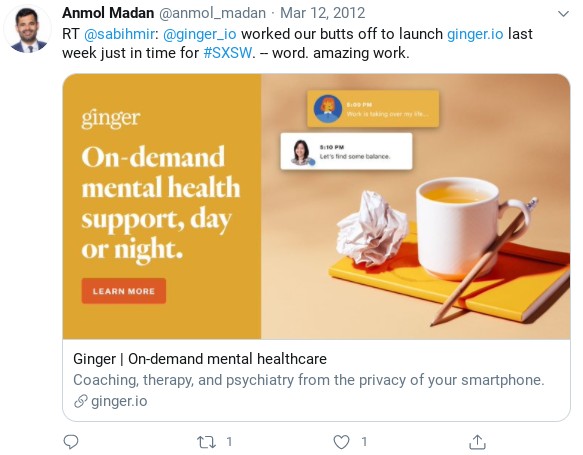
First acquisition, at one year and seven months from founding: In March 2012, Ginger acquires Pipette, a start-up aimed at preventing post-surgery readmissions. The company’s founders, Ryan Panchadsaram and Jimmy Do, join Ginger.io.
“The Pipette team understands the problem of patient-reported outcomes for re-admissions in healthcare,” Madan says in a statement. “By combining their expertise with our passive sensing model, we can improve our models of patient behavior based on passive data. This helps us provide researchers with better data, and providers and payers with population management solutions that lead to better care for chronic patients.”  Accolades, at one year and seven months from founding: In March 2012, Ginger is one of the winners of the SXSW Accelerator challenge.
Accolades, at one year and seven months from founding: In March 2012, Ginger is one of the winners of the SXSW Accelerator challenge. Media coverage, at one year and seven months from founding: In March 2012, Ginger is featured in a story from the Economist.
Media coverage, at one year and seven months from founding: In March 2012, Ginger is featured in a story from the Economist.
“At Ginger.io, a startup in Massachusetts, Amal Madan and his colleagues are building a device that may soon tell us, and our caregivers, when we’re getting sick, based on data streamed from the phone. It’s an app for smartphones, like the Android, and it is currently being tested on patients and in healthcare systems,” the publication explains.
Partnership, at one year and nine months from founding, two months from launch: In May 2012, Ginger partners with the Collaborative Chronic Care Network for a study on patients with Crohn’s disease or ulcerative colitis.
Accolades, at one year and 10 months from founding, three months from launch: In June 2012, Ginger wins Jannsen’s 2012 Alzheimer’s Challenge.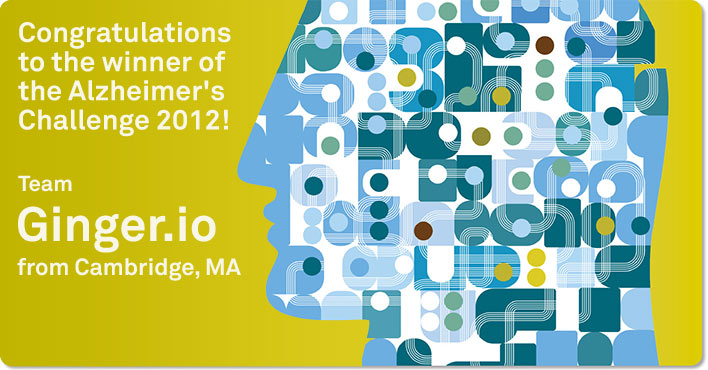
— Ginger’s Third Year —
Media coverage, at two years and two months from founding, seven months from launch: In October 2012, Ginger is mentioned in a New York Times article called, “Apps Alert the Doctor When Trouble Looms.”
“One of the companies with roots in the Media Lab is Ginger.io, which is providing the technology at Cincinnati Children’s Hospital, along with larger deployments set to start this month at hospitals in North Carolina that are part of Novant Health, one of the nation’s largest health care companies,” it says.
Second funding, at two years and two months from founding, eight months from launch: In November 2012, Ginger raises $6.5 million in a Series A funding round led by Khosla Ventures. Existing seed investors True Ventures and Romulus Capital also participate.
“Before Ginger.io, getting continuous, objective data about an individual’s health-related behavior required expensive, proprietary hardware, or a full-time team to monitor the patient. Both approaches expensive and improbable. With Ginger.io, for essentially $0, health care providers can track in almost real-time how people are feeling, and are able to gain the same insights into who may be sick at a much lower cost basis,” Jon Callaghan, co-founder of True Ventures, writes in a blog post.
“At True, we love companies that represent what we call “D2”: disrupt the existing business model by democratizing access to technology that was not previously available. Ginger.io is essentially breaking the old health care model of episode -> treatment -> monitor. As healthy people begin to use Ginger.io, they have a better chance of catching when something is wrong earlier, and health care becomes much more about prevention than treatment. It’s a big, big shift, and one we’re proud to be behind.”
Product, at two years and five months from founding, 10 months from launch: In January 2013, Ginger launches a type 2 diabetes study.
“Back in 2011, Ginger.io won the Sanofi Data Design Diabetes challenge with our diabetes-focused caregiver support app. Since then, we’ve gone under the hood to tweak the engine. We’ve also given our user experience a scrub and added a fresh coat of paint. Shiny,” the company writes.
“We’re feeling giddy about all the work we’ve done, and we’re excited to give lots of people living with diabetes a new way to stay in touch with their health, contribute to science, and help make diabetes care better.”
New logo, at two years and seven months from founding, one year from launch: In March 2013, Ginger unveils a new logo that it says represents better represents its
“Our previous all-caps blue “GINGER.io” logo stemmed from our early days (all the way back in 2011) as a technology company looking to change how data was collected and applied in research and clinical care,” the company writes.
“Since then, we’ve grown into an individual and provider-centric company that’s dedicated to building deeper connections between healthcare providers and their customers through the use of data. Our new look, with its clean, modern lines, reflects these goals and also serves as a recommitment to our values of empathy, trust and accountability.” Accolades, at two years and nine months from founding, one year and two months from launch: In May 2013, Ginger is named to the inaugural CNBC Disruptor 50 List, along with 23andMe, Audax Health, Castlight Health, and ZocDoc.
Accolades, at two years and nine months from founding, one year and two months from launch: In May 2013, Ginger is named to the inaugural CNBC Disruptor 50 List, along with 23andMe, Audax Health, Castlight Health, and ZocDoc.
“Ginger.io aims to engage providers, researchers and consumers in collaboration with each other, with a platform built for the device that people always have handy: the smartphone. The software uses real-time data analytics to change behavior, looking to drive preventative care to save lives and cut costs,” CNBC says.
— Ginger’s Fourth Year —
Merger, at three years and four months from founding, one year and nine months from launch: In December 2013, Ginger merges with BetterFit, a company that uses natural language processing to predict how users will react to drugs. Founder Julia Winn joins Ginger.
“We were first introduced to Julia via the TechStars program. Ginger.io graduated from the program a couple of years ago and Julia was, I believe, in the next batch. So we had common friends in the Harvard MIT community and also within the TechStars community. That’s how we were introduced to Julia,” Madan says in an interview.
“In terms of how we started collaborating, I think we had a couple of conversations about the industry and where our respective companies were going, what we were seeing, what was working across the industry and how we thought it was changing. It actually made sense to combine forces and really go off and do something compelling together.”
Product, at three years and six months from founding, one year and 11 months from launch: In February 2014, Ginger launches Mood Matters, which “uses our platform to understand the triggers that lead to episodes of poor mood.”
“Depression affects 1 in 10 people, and goes undiagnosed for many. With the right support at the right time, depression is treatable. At Ginger.io, we’re working to help you identify the “right time” through a deeper understanding of your daily patterns,” the company writes,
Participation is free and is open to individuals who live in the United States, are between the ages of 18 and 65, own and use an Android or iPhone smartphone and are currently experiencing symptoms of depression.![]() Accolades, at three years and six months from founding, one year and 11 months from launch: In February 2014, Ginger is named by Fast Company as one of the ten most innovative companies in healthcare.
Accolades, at three years and six months from founding, one year and 11 months from launch: In February 2014, Ginger is named by Fast Company as one of the ten most innovative companies in healthcare.
“Ginger.io’s apps track the way patients use their phones—like patterns in communication and location—and employ a number of algorithms to alert caregivers to changes that may indicate symptoms or crises. The technology is currently being rolled out in Cincinnati Children’s Hospital and in North Carolina, through the provider network Novant. To date, Ginger.io has collected more than 6 million data points from patients, which will help the company refine its technology as its customer base grows,” it says.
— Ginger’s Fifth Year —
Product, at four years and one month from founding, two years and six months from launch: In September 2014, Ginger partners with the Centerstone Research Institute and Verizon Wireless to launch coactionHealth, a behavioral health program designed to help patients who have complicated mental and physical conditions manage their health. The three companies entered into a pilot program in April 2014 and, based on its, expanded the program based on its success.
“Providers now have access to more data from more sources than ever before, and connecting that data to physical and mental wellness represents an enormous opportunity to improve outcomes,” Madan says in a statement. “We’re helping providers shift from an episodic view of their patients’ health to a continuous and more comprehensive understanding of personal health trends. The CRI program shows how targeted outreach and an improved patient-provider connection can empower patients to take control of their own health.”
Partnerships, at four years and three months from founding, two years and eight months from launch: In November 2014, Ginger announces new research collaborations with UC San Francisco, Partners HealthCare (Massachusetts General Hospital, Brigham and Women’s Hospital, and McLean Hospital), Duke University, UC Davis and University of Nebraska Medical Center.
With these and other collaborations, Ginger.io says it working with more than half of the top 10 academic medical centers in the U.S.
“Like providers, academic medicine is looking for better ways to understand how patient behaviors affect health outcomes,” Madan says in a statement. “Ginger.io’s smartphone app and analytics engine is essentially a new class of microscope that helps quantify and understand real-world behavior at scale, in many different disease areas. For our academic partners, this offers new insight about clinical characterization, and it may lead to better diagnosis and new therapeutics and interventions for these conditions.”
Product, at four years and four months from founding, two years and nine months from launch: In December 2014 Ginger.io launches Utah SmartCare, which it calls “a next-generation care management project designed to improve patient engagement and health outcomes in low-income Utah populations.” The project focuses on integrating mental and physical health delivery through a technology platform, with the goal of improving the quality and cost of healthcare for this historically underserved population.
The project is led by the Association for Utah Community Health and funded by the Cambia Health Foundation.
“Up until this point, we haven’t had the technology to effectively measure how patients are feeling outside of a care setting. Now that this remote data is more readily available, we are integrating it with the existing healthcare system and using it to deliver the sort of personalized outreach that improves care for patients and drives down costs, both of which substantially benefit the entire system,” Madan says in a statement.
Third funding, at four years and five months from founding, two years and 10 months from launch: In January 2015, Ginger raises $20 million from Dave Schulte, Romulus Capital, Khosla Ventures and True Ventures.
“At Ginger.io, we believe there is tremendous opportunity to revolutionize healthcare by bringing new classes of behavioral data into the clinical assessment process—including mobility, sleep and communication patterns,” Madan says in a statement. “To achieve that, we’ve built a company that combines the best of data science and machine learning principles with leading clinical insights and gold standard population health management practices.”
Product, at four years and 11 months from founding, three years and four months from launch: In July 2015, Ginger launches an app to help mothers with prenatal depression. It collects sensor data, along with self-reported information, to determine how much users move, eat, sleep and talk with people. If the app notices significant changes in behavipr that indicate perinatal depression or anxiety, the app notifies their care provider who can then reach out to them.
Traction, at four years and 11 months from founding, three years and four months from launch: In July 2015, Ginger has partnerships with more than 30 institutions, including eight of the top academic medical centers in the U.S..
— Ginger Today —
In 2017, Ginger relaunched as a healthcare provider, connecting people to its care team of trained health coaches, licensed therapists and board-certified psychiatrists.
















